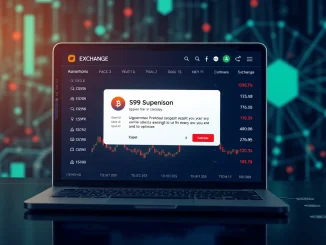
Hold onto your hats, crypto enthusiasts and market watchers! We’re seeing some serious movement in the global currency arena, and it’s sending ripples across the financial landscape. The South Korean Won is making headlines today with a dramatic climb against the U.S. dollar, surpassing a key December peak. What does this mean, and why should you care? Let’s dive into the details.
Why is the South Korean Won Experiencing This Powerful Surge?
Just moments after the trading bells rang on April 9th, the South Korean Won made a significant leap, reaching 1,487.3 won per dollar. This isn’t just a minor fluctuation; it’s a bold statement, pushing past the previous high of 1,487.04 won recorded on December 27th. But what’s fueling this upward trajectory? Several factors could be at play:
- Economic Indicators: Positive economic data coming out of South Korea could be bolstering investor confidence in the Won. Stronger-than-expected export figures or positive GDP growth can signal a robust economy, making its currency more attractive.
- Interest Rate Differentials: If South Korea’s central bank maintains or increases interest rates while the U.S. Federal Reserve holds steady or cuts rates, it can make the Won more appealing to investors seeking higher yields.
- Global Market Sentiment: Shifts in global risk appetite can also influence currency valuations. If investors are feeling more optimistic about the global economy or specifically about Asian markets, they might flock to currencies like the South Korean Won.
- Dollar Weakness: Conversely, weakness in the U.S. dollar itself can contribute to the Won’s rise. Factors like concerns about the U.S. economy, inflation, or geopolitical uncertainties can put downward pressure on the dollar, making other currencies relatively stronger.
It’s likely a combination of these elements that’s creating the perfect storm for the Currency Surge of the South Korean Won. But what are the real-world implications?
Decoding the Impact: What Does a Stronger Won Mean?
A stronger Won Dollar Exchange Rate isn’t just a number on a screen; it has tangible effects across various sectors. Let’s break down some key implications:
| Impact Area | Positive Effects | Potential Challenges |
|---|---|---|
| Imports | Imports become cheaper for South Korean businesses and consumers. This can lead to lower inflation for imported goods and raw materials. | N/A |
| Exports | N/A | South Korean exports become more expensive for international buyers, potentially reducing competitiveness and export volumes. This could impact export-oriented industries. |
| Tourism (Inbound) | South Korea becomes a more affordable destination for tourists from countries using weaker currencies. | N/A |
| Tourism (Outbound) | Traveling abroad becomes more expensive for South Koreans. | N/A |
| Inflation | Potentially helps to curb imported inflation. | N/A |
| Corporate Earnings (Exporters) | N/A | Earnings for South Korean companies that derive a significant portion of their revenue from exports may be negatively impacted when translated back into Won. |
How Does This Relate to the Korean Economy and Cryptocurrency?
While this news directly pertains to traditional currency markets, it’s essential to understand the broader economic context, especially for those invested in or interested in cryptocurrency. The Korean Economy is a significant player in the global crypto space. South Korea has a high rate of cryptocurrency adoption and is home to several major crypto exchanges.
Here’s how currency fluctuations like this can indirectly tie into the crypto world:
- Investor Sentiment: A strong Won can reflect overall positive sentiment towards the South Korean economy. This positive sentiment can sometimes spill over into the cryptocurrency market, potentially encouraging more investment in crypto assets within South Korea.
- Trading Dynamics: Currency exchange rates influence trading pairs on cryptocurrency exchanges. Fluctuations in the KRW/USD rate can impact the price of cryptocurrencies when traded against the Korean Won (KRW).
- Economic Health and Risk Appetite: A strong currency is often a sign of a healthy economy. A healthy economy can foster a more risk-on environment, which can be beneficial for riskier assets like cryptocurrencies. Conversely, economic instability and currency depreciation can sometimes lead to increased interest in cryptocurrencies as a hedge.
Expert Insights: What Are Analysts Saying About the Won’s Performance?
Market analysts are closely watching the Won Dollar Exchange Rate and its recent surge. Early analysis suggests a combination of factors, as mentioned earlier, are contributing to this movement. Some experts point to:
- Potential Intervention: The Bank of Korea’s (BOK) potential actions are always a point of speculation. While a stronger Won can be beneficial in some aspects, excessive appreciation could hurt exporters. Analysts will be watching for any signs of intervention from the BOK to manage the currency’s rise.
- Global Economic Outlook: The overall global economic outlook and expectations for future interest rate movements by major central banks will continue to be key drivers for the Won’s direction.
- Geopolitical Factors: As always, geopolitical events in the region and globally can inject volatility into currency markets, including the Korean Won.
Actionable Insights: What Should You Watch For?
For those tracking the markets, here are some actionable insights and points to monitor:
- Track Economic Data: Keep an eye on upcoming economic releases from South Korea, such as GDP figures, inflation data, and trade balances. Strong data can further support the Won.
- Monitor BOK Statements: Pay attention to statements and policy decisions from the Bank of Korea. Any hints about their stance on the currency’s strength or potential intervention will be crucial.
- Observe Global Dollar Trends: The strength or weakness of the U.S. dollar will continue to play a significant role in the KRW to USD exchange rate. Monitor U.S. economic data and Fed policy signals.
- Stay Informed on Global Events: Geopolitical developments and shifts in global market sentiment can trigger rapid currency movements. Stay updated on global news and events.
In Conclusion: The Won’s Rise – A Sign of Strength?
The South Korean Won’s recent surge against the U.S. dollar is a noteworthy event in the currency markets. It reflects a complex interplay of economic factors, global market dynamics, and potentially, shifts in investor sentiment. While a stronger Won presents both opportunities and challenges for the Korean Economy, it’s a development that deserves close attention from businesses, investors, and anyone interested in the global financial landscape, including the ever-evolving world of cryptocurrency. Keep watching this space – the currency markets are always in motion, and the Won’s journey is far from over!



